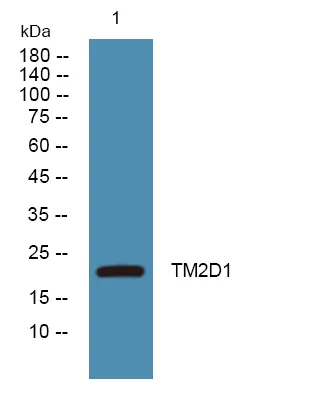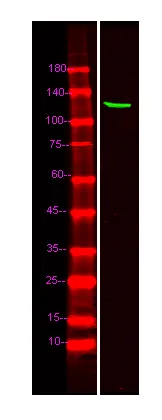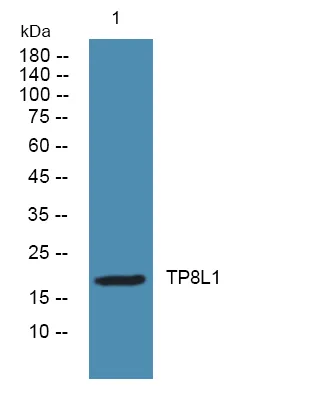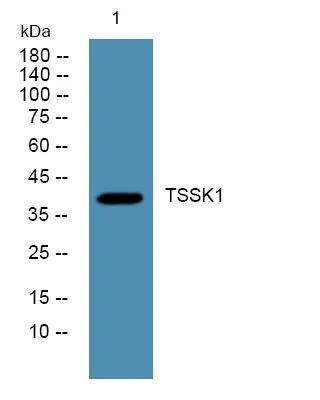产品概述
产品性能
免疫原
产品应用
研究背景
HLA-A belongs to the HLA class I heavy chain paralogues. This class I molecule is a heterodimer consisting of a heavy chain and a light chain (beta-2 microglobulin). The heavy chain is anchored in the membrane. Class I molecules play a central role in the immune system by presenting peptides derived from the endoplasmic reticulum lumen. They are expressed in nearly all cells. The heavy chain is approximately 45 kDa and its gene contains 8 exons. Exon 1 encodes the leader peptide, exons 2 and 3 encode the alpha1 and alpha2 domains, which both bind the peptide, exon 4 encodes the alpha3 domain, exon 5 encodes the transmembrane region, and exons 6 and 7 encode the cytoplasmic tail. Polymorphisms within exon 2 and exon 3 are responsible for the peptide binding specificity of each class one molecule. Typing for these polymorphisms is routinely done for bone marrow and kidney transfunction:Involved in the presentation of foreign antigens to the immune system.,polymorphism:The following alleles of A-1 are known: A*0101, A*0102, A*0103, A*0106 and A*0107. The sequence shown is that of A*0101.,polymorphism:The following alleles of A-11 are known: A*1101 (A-11E), A*1102 (A-11K), A*1103, A*1104, A*1105 and A*1107. The sequence shown is that of A*1101.,polymorphism:The following alleles of A-2 are known: A*0201, A*0202, A*0203, A*0204, A*0205, A*0206 (A2.4A), A*0207, A*0208, A*0209, A*0210, A*0211 (A2.5), A*0212, A*0213 (A*02SLU), A*0216, A*0217, A*0218 (A2K), A*0219, A*0220, A*0221, A*0231, A*0234 (A*AAT), A*0235, A*0236 and A*0237. The sequence shown is that of A*0201.,polymorphism:The following alleles of A-23 are known: A*2301, A*2302, A*2303, A*2304 and A*2305. The sequence shown is that of A*2301.,polymorphism:The following alleles of A-24 are known: A*2401, A*2402, A*2403, A*2406, A*2408 (A9HH), A*2410 (A*24JV), A*2413 (A*24YM), A*2414 (A*24SA) and A*2429. Allele A*2402 is represented in all major racial groups. Allele A*2406 and allele A*2413 are found in the Australian Aborigenal population. Allele A*2414 is found in individuals of South American descent. The sequence shown is that of A*2402.,polymorphism:The following alleles of A-25 are known: A*2501 A*2502 and A*2503. The sequence shown is that of A*2501.,polymorphism:The following alleles of A-26 are known: A*2601, A*2602, A*2603, A*2604 (A-10SA), A*2605, A*2607, A*2608, A*2612 and A*2615. The sequence shown is that of A*2601.,polymorphism:The following alleles of A-29 are known: A*2901 (A29.1), A*2902 (A29.2), A*2903 and A*2904. The sequence shown is that of A*2901.,polymorphism:The following alleles of A-3 are known: A*0301 (A-3.1), A*0302, A*0304 and A*0305. The sequence shown is that of A*0301.,polymorphism:The following alleles of A-31 are known: A*3101, A*3102, A*3103, A*3104, A*3105 (A3101v1) and A*3106. The sequence shown is that of A*3101.,polymorphism:The following alleles of A-32 are known: A*3201, A*3202, A*3203, A*3204, A*3205 and A*3206. The sequence shown is that of A*3201.,polymorphism:The following alleles of A-34 are known: A*3401 (Aw-34.1) and A*3402 (Aw-34.2). The sequence shown is that of A*3401.,polymorphism:The following alleles of A-36 are known: A*3601 and A*3602. The sequence shown is that of A*3601.,polymorphism:The following alleles of A-66 are known: A*6601 and A*6602 (Aw67). The sequence shown is that of A*6601.,polymorphism:The following alleles of A-68 are known: A*6801 (Aw68.1), A*6802, A*6803. A*6804, A*6805, A*6806, A*6807, A*6808, A*6809, A*6810, A*6816 and A*6817. The sequence shown is that of A*6801.,polymorphism:The only allele of A-43 known is A*4301 which is shown here.,polymorphism:The only allele of A-69 known is A*6901 which is shown here.,polymorphism:The only allele of A-80 known is A*8001 which is shown here.,PTM:Polyubiquitinated in a post ER compartment by interaction with human herpesvirus 8 MIR1 protein. This targets the protein for rapid degradation via the ubiquitin system.,PTM:Polyubiquitinated in a post ER compartment through interaction with human herpesvirus 8 MIR1 protein. This targets the protein for rapid degradation via the ubiquitin system.,PTM:Sulfated. Polyubiquitinated in a post ER compartment through interaction with human herpesvirus 8 MIR1 protein. This targets the protein for rapid degradation via the ubiquitin system.,sequence caution:The sequence differs from that shown extensively.,similarity:Belongs to the MHC class I family.,similarity:Contains 1 Ig-like C1-type (immunoglobulin-like) domain.,subunit:Dimer of alpha chain and a beta chain (beta-2-microglobulin). Interacts with human herpesvirus 8 MIR1 protein.,subunit:Dimer of alpha chain and a beta chain (beta-2-microglobulin). Interacts with human herpesvirus 8 MIR1 protein. Interacts with HTLV-1 accessory protein p12I.,subunit:Heterodimer of an alpha chain and a beta chain (beta-2-microglobulin). Interacts with human herpesvirus 8 MIR1 protein.,
研究领域
Endocytosis;Cell adhesion molecules (CAMs);Antigen processing and presentation;Natural killer cell mediated cytotoxicity;Type I diabetes mellitus;Autoimmune thyroid disease;Allograft rejection;Graft-versus-host disease;Viral myocarditis;




